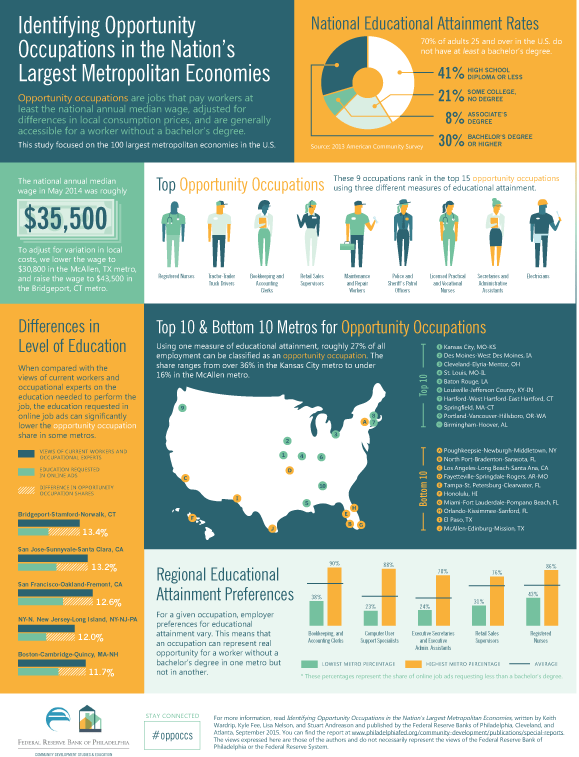- Share
Identifying Opportunity Occupations in the Nation’s Largest Metropolitan Economies
Are there well-paying jobs for people without a 4-year college degree? What and where are these jobs? How do employer preferences differ from education requirements for good jobs? This report summarizes research conducted by the Federal Reserve Banks of Philadelphia, Cleveland, and Atlanta on employment opportunities for workers with lower levels of formal education. Opportunity occupations are jobs generally considered accessible to someone without a bachelor’s degree and that pay at least the national annual median wage, adjusted for differences in local consumption prices. Focusing on the 100 largest metropolitan economies in the US, the researchers identify the most prevalent opportunity occupations in these economies; highlight differences across metropolitan areas; and, by using data extracted from online job advertisements, explore how employer preferences for education affect access to decent-paying employment.
The views expressed in this report are those of the author(s) and are not necessarily those of the Federal Reserve Bank of Cleveland or the Board of Governors of the Federal Reserve System.
In this joint report from the Philadelphia, Cleveland, and Atlanta Federal Reserve Banks, researchers investigate the extent to which the U.S. economy offers decent-paying jobs to workers without a four-year college degree. They define an “opportunity occupation” as one that is generally considered accessible to someone without a bachelor’s degree and that pays at least the national annual median wage, adjusted for differences in local consumption prices.
Focusing on the 100 largest metropolitan areas and using measures that reflect both the typical education needed to enter an occupation and the requisite education suggested by incumbent workers and occupational experts, they find that 27.4 percent of employment could be found in opportunity occupations in 2014. This estimate falls by more than seven percentage points—to 20.3 percent—when they predicate job accessibility on the educational attainment requested by employers in online job ads.
The availability of opportunity-rich work for those without a bachelor’s degree varies dramatically across the metropolitan areas in their study, ranging from 36.6 percent to well under half that level. The educational preferences of employers as expressed in online job ads introduce a potentially significant barrier to economic self-sufficiency for those without a four-year degree, lowering the share of opportunity occupations by more than 10 percentage points in some metro areas.





